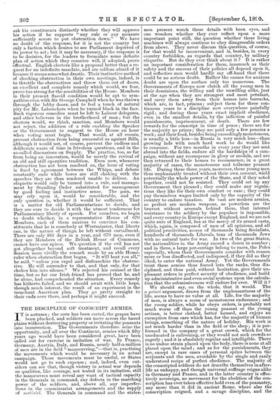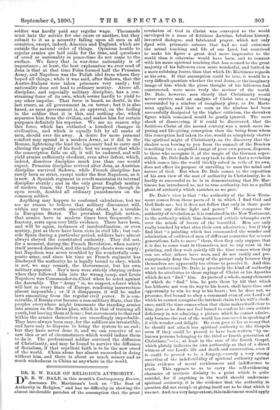THE DISCIPLINE OF CONSCRIPT ARMIES.
T is autumn ; the corn has been carted, the grapes have 1 been plucked, and soldiers can move across the bared plains without destroying property or irritating the peasants into insurrection. The Governments therefore seize the opportunity, and all over the Continent, armies which fifty years ago would have been considered great, have been called out for exercise in imitation of war. In France, Germany, Austria, Italy, and Russia, nearly half-a-million of men are in the field " manceuvring,"—that is, practising the movements which would be necessary in an actual campaign. Those movements must be useful, or States would not go to such expense ; and, indeed, even out- siders can see that, though victory in actual war depends on qualities, like courage, not tested in its imitation, still the manoeuvres must reveal any want of tactical capacity in the Generals in command, any defects in the marching power of the soldiers, and, above all, any imperfec- tions in the commissariat arrangements and the supply of materiel. The Generals in command and the states- men present watch these details with keen eyes, and one wonders whether they ever reflect upon a more important point still, the question whether these living machines will always continue to obey disagreeable orders from above. They never discuss this question, of course, for that would be inconvenient, and is, besides, in every country forbidden, as regards that country, by military etiquette. But do they ever think about it It is rather an important consideration for them, inasmuch as their safety and the success of their policies all depend upon it, and reflective men would hardly say off-hand that there could be no serious doubt. Rather the causes for anxious doubt are upon the surface only too numerous. The Governments of Europe now clutch all the young men in their dominions, the willing and the unwilling alike, just at the age when they are strongest and most petulant, and carry them away from their homes into barracks, which are, in fact, prisons ; subject them for three con- tinuous years to a discipline now everywhere painfully rigid ; and during those years exact implicit obedience, even in the smallest details, by the infliction of painful punishments, imprisonment, or death. There are few rewards for the conscript in time of peace ; there are for the majority no prizes ; they are paid only a few pennies a week; and their food, besides being exceedinglymonotonous, is usually a little less—in Russia is very much less—than growing lads with much hard work to do would like to consume. For two months in every year they are sent abroad into the fields, endure all the hardships of a cam- paign, without any recompense in glory or medals, and are then returned to their homes to recommence, in a great majority of cases, the monotonous and toilsome peasant life. During these three years, moreover, these young men thus unpleasantly treated without their own consent, wield potentially the whole power of the State, and if they acted together, could not be resisted. They could set up any Government they pleased ; they could make any regula- tions they like for their own comfort or ease ; they could pay themselves wages limited only by the capacity of the country to endure taxation. So vast are modern armies, so perfect are modern weapons, so powerless are the bravest without arsenals behind them, that internal resistance to the soldiery by the populace is impossible, and every country in Europe except England, and we are not quite sure of England, lies at the mercy of its armed caste, which, again, is composed of men of all opinions, and all political proclivities, scores of thousands being Socialists, hundreds of thousands Liberals, tens of thousands Jews with no natural taste for war. In two of the great States, the nationalities in the Army exceed a dozen in number ; and in three, a large per-tentage belong to races, the Poles especially, whom their Governments consider with reason more or less disaffected, and indisposed, if they did as they liked, to enter the national Army. Yet the Governments trust these armies thus forced into the ranks, thus dis- ciplined, and thus paid, without hesitation, give their un- pleasant orders in perfect security of obedience, and build up administrative and even social systems upon the calcula- tion that the submissiveness will endure for ever. Will it ?
We should say, on the whole, that it would. The a priori argument, drawn from the unpleasantness of the life, seems to have no value at all. Life, for the majority of men, is always a scene of monotonous endurance ; and the young soldier, while he obeys orders, is probably not much worse off than the young peasant or the .young artisan, is better clothed, better housed, and enjoys an exemption from care which has, for the majority of human beings, something of the nature of holiday. His work is not much harder than in the field or the shop; it is per- formed in the company of a great crowd, which for the uneducated is enlivening, or they would not seek crowds so eagerly ; and it is absolutely regular and intelligible. There is no undue strain placed upon the body, there is none at all placed upon the mind ; and as for the punishments, they are, except in rare cases of personal spites between the serjeants and the men, avoidable by the single and easily understood recipe of perfect obedience. The majority of the conscripted soldiers do not describe themselves in after- life as unhappy, and though universal suffrage reigns alike in Germany and France, and in the latter country is effec- tively sovereign, no movement for the abolition of the con- scription has ever taken effective hold even of the peasantry, any more than it did in ancient Rome, where also the conscription reigned, and a savage discipline, and the soldier was hardly paid any regular wage. Thousands must hate the service for one cause or another, but they submit to it as a necessity falling upon all men in all countries, except, indeed, America and England, which are outside the natural order of things. Opinions hostile to regular armies are laid aside for the time, and questions of creed. or nationality in peace-time do not come to the surface. We fancy that in war-time nationality is of importance ; at least, the best explanation we ever read of Jena is that at that time Poles formed half the Prussian Army, and Napoleon was the Polish idol from whom they hoped all things ; while it was said, after Sadowa, that the Austro-Italians were taken prisoners very easily ; but nationality does not lead to ordinary mutiny. Above all, discipline, and especially military discipline, has a con- straining force of its own, which seems hardly to yield to any other impulse. That force is based, no doubt, in the last resort, as all government is, on terror ; but it is also based, as most government is, on approval, on the feeling in the soldier that it is this, and nothing else, which separates him from the civilian, and makes him for certain purposes definitely his superior. We see no reason why this force, which has outlasted a hundred changes in civilisation, and which is equally felt by all ranks of men, should ever die away. A desire for more personal comfort may spread in a modern Army, as it did in the Roman, lightening the load the legionary had to carry and altering the quality of his food ; but we suspect that while the conscription falls on all, it will be endured, and will yield armies sufficiently obedient, even after defeat, which, indeed, dissolves discipline much less than one would expect. Prussian discipline revived after Jena, as Austrian discipline survived. Sadowa, while French discipline has rarely been so strict, except under the first Napoleon, as it is now. A Spanish regiment in revolt maintains its internal discipline sternly ; and in the only great English mutiny of modern times, the Company's Europeans, though in open revolt, doubled. all ordinary punishments on the common soldier.
Anything may happen to confound calculation, but we see no reason to believe that military discontent will, within any time worth speculating about, be a trouble in European States. The prevalent English notion, that armies have in modern times been frequently re- fractory, rests upon very little evidence. There have been, and will be again, instances of insubordination, or even mutiny, just as there have been riots in civil life ; but out- side Spain during a particular period, soldiers have almost always obeyed the constituted authority. They did not, for a moment, during the French Revolution, when society itself seemed dissolved, and the military chests were empty; but Napoleon was never troubled by his wonderfully com- posite army, and since his time no French regiment has disobeyed the authority he is legally bound to obey, which is not, we may remark, the Government, but his own military superior. Ney's men were strictly obeying orders when they followed him into the wrong camp, and Louis Napoleon was Commander-in-Chief when he acted against the Assembly. The " Army " is, we suspect, a force which will last in every State of Europe, rendering insurrection almost impossible ; or if it disappears, it will be under laws emanating from the regular civil power. It is con- ceivable, if Russia ever became a non-military State, that the peoples everywhere might transmute the standing armies into armies on the Swiss plan, which is that of training all youth, but leaving them at home; but movements to that end within the armies themselves are exceedingly improbable. They have always been easy, for the soldiers are irresistible, and have only to disperse to bring the system to an end; but they have never done it, and we can conceive of no new idea or set of circumstances which would induce them to do it. The professional soldier survived the diffusion of Christianity, and may be found to survive the diffusion of Socialism, if that repellent faith is to be the new creed of the world. China alone has almost succeeded in doing without him, and there is about as much misery and as much wickedness in China as anywhere in the world.



































 Previous page
Previous page